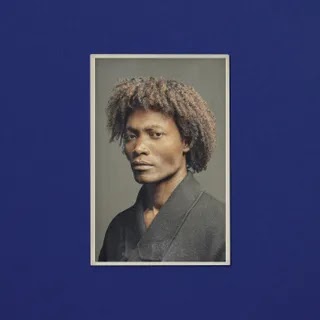On his third album—the first part of a projected trilogy—the singer-songwriter retains all his theatrical intensity while shifting his focus to songs about love, a subject he once spurned.
For the better part of a decade, Benjamin Clementine has been a hostage to his own narrative: the North London boy who taught himself piano by listening to classical radio; the wayward teen who fled to Paris, slept rough, and busked as a means of survival. If you skim through interviews from 2014—before Clementine secured the Mercury Prize for his debut album, At Least for Now—you can see that the musician has long been wary of his own bio. On his third full-length, And I Have Been, Clementine comes to terms with his identity and all of the experiences that shaped it over time. These songs were written at home in the mountains of Ojai, California, but they still sound like they’re curling through Parisian corridors; Clementine is finally at peace with the lingering past. Still impossible to pigeonhole, his hybrid of classical, chamber pop, baroque, and jazz is as thrilling as ever, while the newly stripped-back arrangements heighten the intimacy of a songwriter seeing himself clearly.
Clementine has referred to And I Have Been as his “light” album. It is the first of three parts, which will, he says, get progressively darker—the third chapter may be his final record. It’s hard to envision Clementine writing anything frothy, and his latest work is only “light” compared with the high melodrama of At Least for Now and 2017’s I Tell a Fly. And I Have Been retains Clementine’s theatrical intensity; his voice stretches from robust, oaky lows to highs that crackle like an electrical storm. But in a surprising turn, he succumbs to a musical inevitability: maneuvering his gale-force instrument to sing about love. Clementine once spurned the subject, noting that his songs had more to say than, “Baby, I want to have you.” But his recent role as a husband and father has made the trope inescapable. He married singer-songwriter Flo Morrissey in 2018, and the couple have two young children together. These experiences may have pushed Clementine to write his very first pop songs.
“Auxiliary” is a snapshot of pandemic parenthood, starring Clementine as the unlikely optimist. “I see our world is up in flames,” he sings, sprightly piano and acoustic guitar cresting underneath. But the forecast has a silver lining: “We will survive/Takes you and I/To make our child smile.” On the vamping, neo-blues “Lovelustreman,” Clementine allows himself to enjoy the cliches he once snubbed: “Everything I do is all for you/Believe, you’re my number one.” For an artist who looks to William Blake for inspiration more than Lennon and McCartney, a man who makes up words and penned an entire dictionary with personalized definitions, “Auxiliary” and “Lovelustreman” can feel less lyrically exciting than prior work. But they seem to be an indication that Clementine is loosening up, and occasionally indulging instinct over intellect.
Though Clementine exalts domesticity, being a father at times stirred up his own childhood trauma. He found himself confronted with his history, and for the first time, he embraced it. On the dark waltz “Genesis,” which Clementine has said is about the “constant denial” of his roots, he accepts being “trapped in free”—unsettling shorthand for the past staining the present. In his dry, velvety tenor, he condemns and celebrates this lineage; it exists “no matter where we go,” and ebbs like “settling tides.” It may recede for a while, but the return is unavoidable. In the parallel “Gypsy, BC,” the narrator speaks to a nomad repeating an endless cycle. “Try to go wherever you wanna go/But you’re not free,” Clementine sings, as geyser strings settle over piano. In the song’s final third, he seals his own fate: “Just in case you forget/Gypsy’s been always you.” It’s Clementine’s way of welcoming his shadow, knowing that it is blotted behind every step.
Despite Clementine’s insistence that this is his “light” album, on And I Have Been he grapples with nothing less than life’s cyclical nature. On “Delighted,” he lobs a ball upward and then watches gravity snatch it back down. “We lean, we learn, we earn, we turn, we burn/Then start again” he observes. Violin and a multi-tracked soprano surge in the background. The strings nearly clot the song with their filigree, but they are tempered by Clementine’s earthy, rust-worn voice. At times these cycles are indicated in a song title. “Atonement” points to an inglorious deed; “Residue” suggests the untidy object that came before. The latter is home to one of Clementine’s best lines: “Gluttony ain’t good/Sadness is food… Sadness is wine.” Both metaphors convey the delicious indulgence of depression. But it’s the minimal piano ballad “Copening” that presents Clementine humbly “howling home,” an image that renders the pain and pleasure of shuffling back to where you came from. Upon returning, Clementine entertains the phantoms of his past. They drink to the future.



0 comments:
Post a Comment